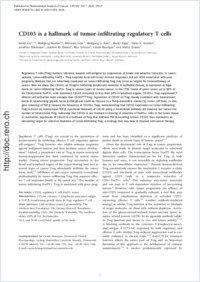CD103 is a hallmark of tumor-infiltrating regulatory T cells
- Anz, David Center of Integrated Protein Science Munich CIPS M , Division of Clinical Pharmacology, Munich, Germany - Medizinische Klinik Innenstadt, Ludwig Maximilian University Munich, Germany
- Mueller, Wolfgang Center of Integrated Protein Science Munich CIPS M , Division of Clinical Pharmacology, Munich, Germany
- Golic, Michaela Center of Integrated Protein Science Munich CIPS M , Division of Clinical Pharmacology, Munich, Germany
- Kunz, Wolfgang G. Center of Integrated Protein Science Munich CIPS M , Division of Clinical Pharmacology, Munich, Germany
- Rapp, Moritz Center of Integrated Protein Science Munich CIPS M , Division of Clinical Pharmacology, Munich, Germany
- Koelzer, Viktor H. Center of Integrated Protein Science Munich CIPS M , Division of Clinical Pharmacology, Munich, Germany
- Ellermeier, Jonathan Medizinische Klinik Innenstadt, Ludwig Maximilian University Munich, Germany
- Ellwart, Joachim W. Institute for Experimental Hematology, Cell Sorting Facility, Helmholtz Centre, Munich, Germany
- Schnurr, Max Medizinische Klinik Innenstadt, Ludwig Maximilian University Munich, Germany
- Bourquin, Carole Center of Integrated Protein Science Munich CIPS M , Division of Clinical Pharmacology, Munich, Germany - Medicine Department, University of Fribourg, Switzerland
- Endres, Stefan Center of Integrated Protein Science Munich CIPS M , Division of Clinical Pharmacology, Munich, Germany
-
01.04.2012
Published in:
- International Journal of Cancer. - 2012, vol. 129, no. 10, p. 2417–2426
English
Regulatory T cells (Treg) mediate tolerance towards self-antigens by suppression of innate and adaptive immunity. In cancer patients, tumor-infiltrating FoxP3+ Treg suppress local anti-tumor immune responses and are often associated with poor prognosis. Markers that are selectively expressed on tumor-infiltrating Treg may serve as targets for immunotherapy of cancer. Here we show that CD103, an integrin mediating lymphocyte retention in epithelial tissues, is expressed at high levels on tumor-infiltrating FoxP3+ Treg in several types of murine cancer. In the CT26 model of colon cancer up to 90% of the intratumoral FoxP3+ cells expressed CD103 compared to less than 20% in lymphoid organs. CD103+ Treg suppressed T effector cell activation more strongly than CD103neg Treg. Expression of CD103 on Treg closely correlated with intratumoral levels of transforming growth factor β (TGF-β) and could be induced in a TGF-β-dependent manner by tumor cell lines. In vivo, gene silencing of TGF-β reduced the frequency of CD103+ Treg, demonstrating that CD103 expression on tumor-infiltrating Treg is driven by intratumoral TGF-β. Functional blockade of CD103 using a monoclonal antibody did however not reduce the number of intratumoral Treg, indicating that CD103 is not involved in homing or retention of FoxP3+ cells in the tumor tissue. In conclusion, expression of CD103 is a hallmark of Treg that infiltrate TGF-β-secreting tumors. CD103 thus represents an interesting target for selective depletion of tumor-infiltrating Treg, a strategy that may help to improve anti-cancer therapy.
- Faculty
- Faculté des sciences et de médecine
- Department
- Département de Médecine
- Language
-
- English
- Classification
- Biological sciences
- License
-
License undefined
- Identifiers
-
- RERO DOC 30502
- DOI 10.1002/ijc.25902
- Persistent URL
- https://folia.unifr.ch/unifr/documents/302809
Statistics
Document views: 118
File downloads:
- pdf: 562
